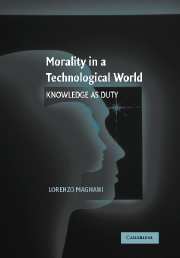Book contents
- Frontmatter
- Contents
- Preface
- 1 Respecting People as Things: Environment
- 2 Treating People as Means: Cloning
- 3 Hybrid People, Hybrid Selves: Artifacts, Consciousness, Free Will
- 4 Knowledge as Duty: Cyberprivacy
- 5 Freedom and Responsibility: Bad Faith
- 6 Creating Ethics: Good Reasons and Good Arguments
- 7 Inferring Reasons: Practical Reasoning, Abduction, Moral Mediators
- Afterword
- References
- Index
4 - Knowledge as Duty: Cyberprivacy
Published online by Cambridge University Press: 18 July 2009
- Frontmatter
- Contents
- Preface
- 1 Respecting People as Things: Environment
- 2 Treating People as Means: Cloning
- 3 Hybrid People, Hybrid Selves: Artifacts, Consciousness, Free Will
- 4 Knowledge as Duty: Cyberprivacy
- 5 Freedom and Responsibility: Bad Faith
- 6 Creating Ethics: Good Reasons and Good Arguments
- 7 Inferring Reasons: Practical Reasoning, Abduction, Moral Mediators
- Afterword
- References
- Index
Summary
… none of the moral virtues is engendered in us by nature, since nothing that is what it is by nature can be made to behave differently by habituation.
Aristotle, Nicomachean EthicsThe aim of this book is, of course, to convince readers that knowledge has become a duty in our technological world. Thus far in my attempt to do so, I have combined ethics, epistemology, and cognitive science and have analyzed the relationship between moral mediators and respecting people as things. Remember that this second issue arises from the fact that technological advances have given greater value to external things, both natural and artificial. While this may seem to bode ill for human beings, I believe that we can use these things as moral mediators that serve a sort of “copy and paste” function: we can take the value of, say, that library book we spoke of and transfer it to a person. Using moral mediators in this way, however, will require the construction of a vast new body of knowledge, a new way of looking at the world.
In the previous chapter, I contended that improving human dignity in our technological era requires that we enhance free will, freedom, responsibility, and our ownership of our own destinies. To do so, it is absolutely necessary to respect knowledge in its various forms, but there are other ideas to consider as well: first, knowledge has a pivotal role in anticipating, monitoring, and managing the hazards of technology, and second, it has an intrinsic value that must be better understood, as do general information and metaethics itself.
- Type
- Chapter
- Information
- Morality in a Technological WorldKnowledge as Duty, pp. 93 - 127Publisher: Cambridge University PressPrint publication year: 2007



